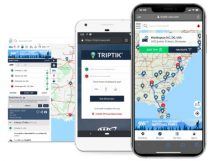 FRANKFORT, Ky. — Kentucky’s economic challenges and opportunities was the focus of the American Enterprise Institute (AEI)’s American Dream Solutions Summit, which provided insights about policies designed to increase opportunity and upward mobility for the state’s families and communities.
FRANKFORT, Ky. — Kentucky’s economic challenges and opportunities was the focus of the American Enterprise Institute (AEI)’s American Dream Solutions Summit, which provided insights about policies designed to increase opportunity and upward mobility for the state’s families and communities.
Kentucky’s Prosperity Equation
Kentucky policy leaders kicked off the day discussing ways Kentucky lawmakers are reaching across party lines to address the issues facing all areas of the state.
Kentucky Senate President Robert Stivers and Senate Minority Leader Gerald Neal, two of the state’s longest-serving legislators, were on a panel moderated by Kentucky Chamber President and CEO Ashli Watts where they discussed their very different areas of the state and the ways they work together to pass policy that helps all Kentuckians.
At the beginning of the discussion, each leader talked about how they got involved in politics and what has kept them involved. Stivers said both of his parents gave him a desire to make a difference and emphasized, “if you turn that corner on Capital Avenue and you aren’t in awe, then it’s time to go home.” Neal said he got involved in the civil rights movement in college and wanted to take it further so he became a lawyer and then went on to serve in policy to help address structural deficiencies he saw in his district.
They also discussed the way they have built trust with each other and others, which is critical to tackling issues like second chance employment, child care, positive health outcomes, and immigration as solutions to the Kentucky’s workforce crisis. These issues rise the tide under all boats and help the whole state, they agreed.
Stivers and Neal said the 2024 session saw many positive outcomes with bipartisan support despite differing opinions and they pointed to housing and other topics as policy priorities moving forward.
A New Vision for Removing Barriers to Opportunity Across America
Since President Lyndon B. Johnson declared a “War on Poverty” from a front porch in Martin County, Kentucky 60 years ago, there have been many areas of both progress and setbacks in those areas.
Leaders of the AEI Center on Opportunity and Social Mobility have found that while there has been a 90 percent reduction in poverty in America, so many children remain at the bottom of the economic ladder with entrenched poverty and social poverty causing huge issues within society.
Kevin Corinth, deputy director of AEI’s Center on Opportunity and Social Mobility, noted that 1 in 10 working age Kentuckians were dependent on government services for more than half of their income in 1963. Today, that number is 1 in 5 Kentuckians. He said it is important to provide assistance to those who need it, especially temporary, and then focus on the pathway out of poverty.
Neither political party has had the right approach on this issue, Center on Opportunity and Social Mobility Director Scott Winship said adding there are many disincentives built into the system that do not help Americans lift out of poverty. Kentucky-specific statistics show children who are born into the 25th percentile end up in the 44thpercentile in Bardstown at the state’s best, slightly above the national average of the 42nd percentile. Meanwhile, that number is at its lowest in Lexington where children typically end up in the 37th percentile.
Winship and Corinth said the United States has a long way to go to help people get out of poverty in the next generation. Some of the things they pointed to were empowering a strong family system through marriage and increased social capital which involves interacting with neighbors, trust in institutions, involvement in groups and organizations and more.
“We need to think more creatively about ways that government can address these things, which are economic issues as well as a driver of things like the mental health crisis,” Winship said.
Breaking Cycles of Dependency: A Social Safety Net That Works
There are 105 means-tested programs within the nation’s “social safety net.” Tennessee Department of Human Services Commissioner Clarence Carter says that system struggles because there is no overarching objective focused on freeing people to act in their own best interest and give individuals the tools they need to achieve.
All of the different programs have their own rules and funding streams. Kentucky House Speaker Pro Tem David Meade noted the system was created to be a hand up, not a hand out. But all of these disconnects and silos have made it easy to get people in the system but very hard to help them get off the programs. And Kentucky is one of the nation’s more assistance dependent states.
To address this, Meade noted the Kentucky legislature has been working in the last five years to address these issues through policy, but he pointed to many road blocks created by the federal government. A bill passed by the General Assembly in recent years has some sections that are stalled by federal government regulations. Meade said Kentucky is standing in its own way as the state has previously waived the federal requirement to be involved in education or work programs to receive SNAP, which lawmakers are looking to fix with legislation.
In Tennessee, Carter said they are working to use their Temporary Assistance for Needy Families (TANF) program to build a statewide fatherhood initiative because fathers are crucial and they want to make Tennessee a “whole family” friendly state. The state has also built an economic absentee initiative focusing on people who are not retired, caregivers, or students that are not participating in the workforce, seeking to find those solutions to reach a goal of getting Tennessee back up to 70 percent workforce participation rate.
“Work is not a dirty word. It may be a four-letter word, but it is not a dirty word,” Carter said emphasizing work should be viewed as a pathway to freedom.
Both Meade and Carter also discussed innovative solutions where government can work with the business community to address things like child care and more which can help individuals be less reliant on public assistance.
Pathway to Power: Inspiring a Success Mindset in Kentucky’s Youth
AEI Senior Fellow Ian Rowe said many young people see the promise of our nation slipping out of their reach. Recent data shows young Americans feel the country is moving in the wrong direction and find it hard to find hope.
“We have the opportunity to inspire by demystifying how upward mobility is being realized,” Rowe said.
Rowe showed a map illustrating that intergenerational mobility varies substantially among states while we are all governed by the same system nationally, which implies the biggest factor is what is happening in local communities.
Three characteristics he highlighted as some of strongest predictors are a strong family structure, higher participation in religious and civic organizations, and a K-12 school system with higher test scores and smaller class sizes.
“We must communicate to young people, especially who are struggling, that their life can be their own,” Rowe said.
Bottom Up Solutions to Strengthen Kentucky Families and Communities
Three Kentucky leaders discussed their different approaches to helping those who need it most.
Goodwill Industries of Kentucky CEO and Kentucky Chamber Executive Committee Member Amy Luttrell noted poverty is so complex and while Goodwill’s services are open to everyone, they often see those who have been incarcerated, have substance use disorder, or are experiencing homelessness. Luttrell noted while many of these Kentuckians have a lot of needs, they have even more motivation and talent.
“The biggest killer of motivation is a lack of hope,” Luttrell said adding Goodwill seeks to come alongside an individual to address the issues of access to services and community.
Justin “Jay” Miller, dean of the College of Social Work (CoSW) at the University of Kentucky, was taken out of his home and put into foster care at a young age as his mother passed and his father struggled with substance use disorder. He said the foster care system was the best thing that happened to him because he knew the alternative, and it made him want to go into this work so he could help other children and families. Now leading CoSW, Miller is focused on making social work education accessible.
Addiction Recovery Care (ARC) has grown substantially in recent years and is now in many areas of the state as they have helped more than 75,000 individuals and their work is seen as a national model.
ARC CEO Tim Robinson detailed his personal journey of gaining social capital through mentorship, a way out of social poverty when he got sober following eight years of struggle with alcohol abuse, and overcoming the poverty of purpose when he started ARC almost 15 years ago.
Robinson shared many statistics on the economic impacts of substance use disorder and opioid use on workforce and complimented the Kentucky Chamber, noting it is an organization that doesn’t take a “put your head in the sand” approach but instead looks at the data and finds solutions to the state’s collective issues.
As for some of the issues the state still struggles with, Luttrell noted the work of Goodwill to strengthen families because that stability, she said, is crucial for success and they see many struggling because of everything from gang involvement to being transient.
Robinson also emphasized the importance of family stability pointing to Census data showing 60 percent of elementary school-aged kids in eastern Kentucky are being raised by neither of their biological parents. He shared that he adopted two daughters who are the children of a mother in active addiction and fathers who are in and out of prison, and while he is happy to have his daughters, it would have been best for them if their parents were able to raise them.
Miller said “so many times we are giving people what we have and not what they need,” and emphasized the importance of all groups working together as each has their area of strength.
The Future of Work in Kentucky: Education, Skills, and Opportunity
A panel with education leaders focused on the challenges and economic opportunities Kentucky is facing, the work that is currently being done in education systems, and opportunities moving forward to change the landscape of Kentucky’s education and workforce.
Dr. Aaron Thompson of the Council on Postsecondary Education said there needs to be a systematic way to engage students as early as possible in career exploration so that they understand what opportunities are available to them.
As for the future of Kentucky’s workforce, Thompson said that 62% of individuals will need a certificate in post high school education to have significant employment, so it is critical to understand the value of the different degrees and certificates and the various education paths available.
While panelists spoke on the key role of four-year degrees at colleges and universities in Kentucky’s economy, there are options available to students that may be better suited to their interests.
Dr. Ryan Quarles of the Kentucky Community and Technical College System spoke on the importance of reducing the stigma surrounding technical education, stating that there are over 700 career pathways offered at KCTCS.
He also added that as graduation is approaching, he is seeing students come out with a job where they will earn more than $70,000 in their first year of work.
Looking at education and workforce holistically, John Pallasch of One Workforce Solutions spoke about the importance of building dynamic pipelines to fill workforce needs, working together to solve workforce issues, and looking at data to understand what is working and how things can work better.
A Conversation with Coach Vince Marrow and Joe Craft
As one of 12 siblings, University of Kentucky Associate Head Coach Vince Marrow grew up without a lot. But he didn’t know that at the time.
The son and grandson of ministers, Marrow wanted to be a minister himself when he was young. His goals changed throughout the years but he feels he still uses some elements of ministry especially in his recruitment of players.
He ended up in sports after watching two of his older siblings play, which made him want to pursue this path. That alone makes him urge anyone with younger siblings the importance of understanding that they will want to emulate your actions whether that is playing sports, selling drugs, or anything else.
As for economic and life advice for young men and women, Marrow emphasized the need to have goals and write them down. Especially at the level he coaches, he said students must have the will to win, the will to work, and the will to succeed. And in coaching, Marrow works hard to ensure his players understand there will be bumps in the road of life and part of his job is preparing them for that through lessons in sports.











